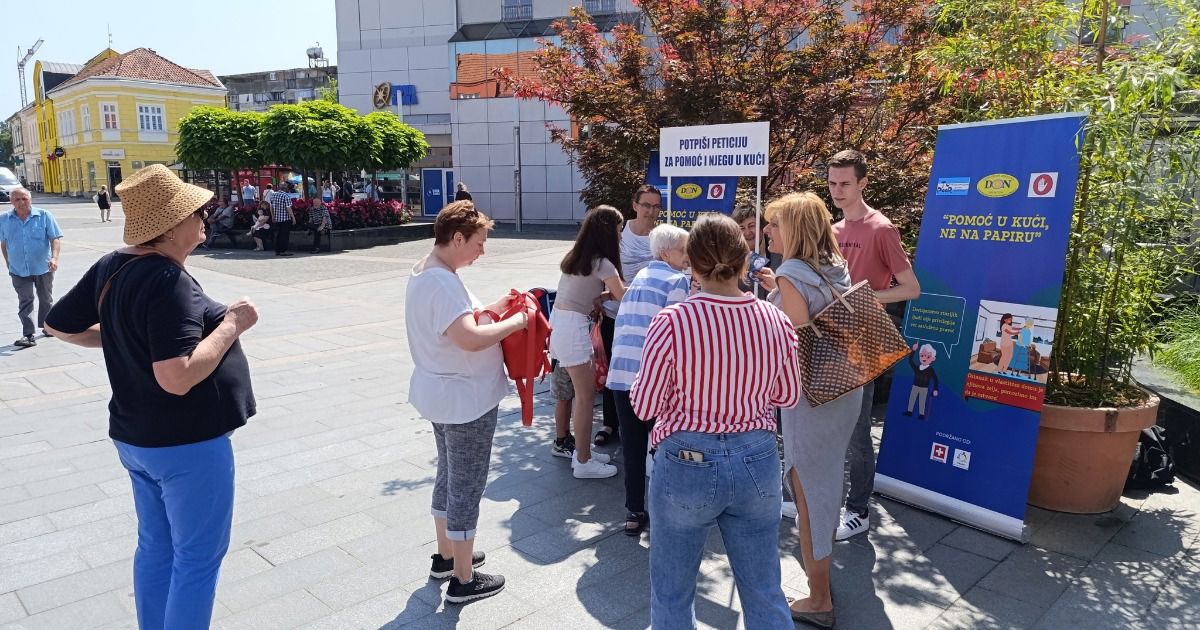
Hundreds of elderly and ill individuals in the Republic of Srpska live alone today, without the daily support they need. Although the law recognizes the right to home care and assistance, this service remains largely unavailable in most local communities.
Within the PRAGG project, civil society organizations DON Prijedor, Topeer Doboj, and Stop Mobbing Trebinje have been working for months to draw attention to this issue. Their goal is to ensure that local communities provide a permanent and systemic home care service – primarily for the elderly, people with disabilities, and those who are ill and live alone or in households without someone to help them. They have visited several municipalities and towns – including Prijedor, Kozarska Dubica, Novi Grad, Doboj, Nevesinje, and Gacko – where they conducted street actions, informed citizens about their ongoing activities, and invited them to sign a petition advocating for this basic social right.
“We have also sent a request for a meeting with the Ministry of Health and Social Welfare of the Republic of Srpska, where we would present the Initiative for Amendments to the Rulebook on the Exercise of the Right to Home Care and Assistance in the Republic of Srpska. Together, we hope to develop the best possible model that can be implemented in practice. Home care is essential to ensure a dignified life for elderly people, persons with disabilities, and other vulnerable groups in their own homes, with adequate care, support, and protection. At the same time, this service significantly relieves the burden on the healthcare and social welfare systems, enabling a more efficient allocation of resources. We are confident that the Ministry shares our view on the importance of this issue and that, together, we can take steps toward building a more humane, accessible, and accountable system of social protection,” stated the DON Association from Prijedor.
Local communities are showing signs of support. The Center for Social Work in Prijedor supported the introduction of home caregivers and the development of local regulations. The director of the Center for Social Work in Kozarska Dubica signed a letter of support for the campaign, emphasizing the importance of providing concrete assistance to elderly and vulnerable fellow citizens. In Novi Grad, the director of the local Center for Social Work stressed the need for social mapping in every community to assess the actual level of need.
The legal framework exists – but implementation is lacking. Current laws in the Republic of Srpska already recognize the right to this type of support. However, as retired lawyer Dobroslav Šarović explains, the situation in practice is very different:
“I think the law should simply be enforced. It's clear, everything is fine on paper, but the problem is that it's not being implemented. Although the law provides for assistance to elderly people who cannot function independently, in many municipalities this service has not taken root. Resources are lacking, responsibility is being shifted, and time is passing. Those most at risk are left to fend for themselves. I'm a pensioner myself, and I know. With age come inevitable illnesses. I know many cases where people live alone, they’re unable to take care of themselves, they have no children or their children live abroad – it's truly a serious problem.”
He adds that the alternative to home care is placement in a nursing home, but questions whether this is suitable for retirees in the Republic of Srpska – considering their character, psychological needs, and financial situation.
“Knowing our people's mentality, they prefer staying in their own homes. Very few can afford the expenses that come with institutional care. I firmly believe we must enable people to receive the care they need in their own homes and familiar surroundings. That’s better for both society and the state.”
Healthcare professionals have also joined the initiative, pointing out that home care is essential both for patients and for medical staff. They emphasize that elderly individuals benefit most from staying in familiar environments, with care tailored to their actual needs – including both medical and psychosocial support.
“This must be a continuous effort – we need to push for this initiative to be adopted and implemented in a way that best serves both the patient and the staff providing home visits. Personally, I believe elderly people should stay in their own homes if at all possible, because that’s what matters most to them. When they’re placed in nursing homes, they become disconnected from their family, friends, neighbors, and everything familiar – and many don’t even have the financial means to go to such facilities,” emphasizes Nina Radić, Head Nurse at the Health Center in Trebinje.
In the coming period, the associations will continue collecting support and holding talks with institutions to create the conditions necessary for making this service accessible to everyone who needs it.




